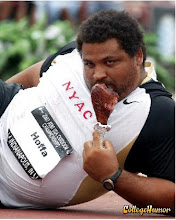MJS--
Thanks for the feedback. I was not using it as a legal term, but as an everyday life term.
Cordially,
Terry
That was basically the total correspondence between us, you know his response and my letter which can be seen in my previous blog.
Okay, so I just want to break things down a little quickly. While I have the utmost respect for professional writers, and Mr. Frei is included here, they can manage to be deflective if they feel like it.
Now, I didn't want to get too into the legalities of what Terry wrote, but I did want to make a point that misusing legal terms can hurt your overall message or the sport you happen to be discussing. As per his e-mail, we're going to have to take Terry Frei at his word, that he was using implied consent as "an every day life term." But come on, the last time that I heard "implied consent" in regular conversation was never; at least in any conversation that didn't involve the law. Also, if you look at the context in his article, it was clearly a statement about the law.
I am making such a big deal about sports and the law because while, in watching a game the idea of the law never comes up, whenever sports are discussed in the real world there is often a legal discussion to go with it. Think about the things that have gone on in sports in the last year or so. There has been Michael Vick, Pacman Jones, and their ilk combined with things like the CBA and the European transfer agreement in hockey, as well as a CBA issue that will start to evolve in the next year or so in the NFL.
Also, I think adding the legal discussion to the NHL actually helps the league's credibility. Every time the law is brought into the pro sports conversation it is because someone got shot, robbed, arrested, etc. We hardly ever see how a sport can interact with the law in ways that can be, probably not positive, but at least right. This law suit is a demonstration of how there are rules and boundaries in the league and how they can be broken. Why is that good? Because it shows just how far things in hockey like checking and fighting go. This suit would help clarify issues like "The Code" and the roles enforcers play in the sport.
Many people see those types of players in a negative light, no better than common thugs. But most non-hockey fans don't know the code. They don't know that you're not supposed to throw sucker punches. They don't know how most fights are agreed to ahead of time. They just don't know. Because they don't know how or why fighting is acceptable to the players they don't know why the league condones it. The league's perception of hockey fights is that anything goes. There has been a need for a long time of a way to clarify the difference between savagery and a consensual scrap. Steve Moore's lawsuit would help do that.
The problem is that the suit is likely to be settled before it goes to trial. 95% or more of lawsuits get settled before they ever see a court room, I'm sure it also works that way in Canada.
This suit shouldn't be seen as an embarrassment to the league. It should be seen as a way to get some credibility for the league. If Gary Bettman was smart he would make a statement saying that he was glad that there was resolution to this issue and that he was glad that, since the issue called for it, the law was able to resolve Steve's problems. At the same time, Gary doesn't need to say anything about Todd Bertuzzi. He can just not say anything about it.
I hope that this gets resolved because it has been far too long already. Both Todd Bertuzzi and Steve Moore need it. The league seems completely indifferent to it now. They shouldn't be. They should help the process however they can, and try and be better for it.




No comments:
Post a Comment